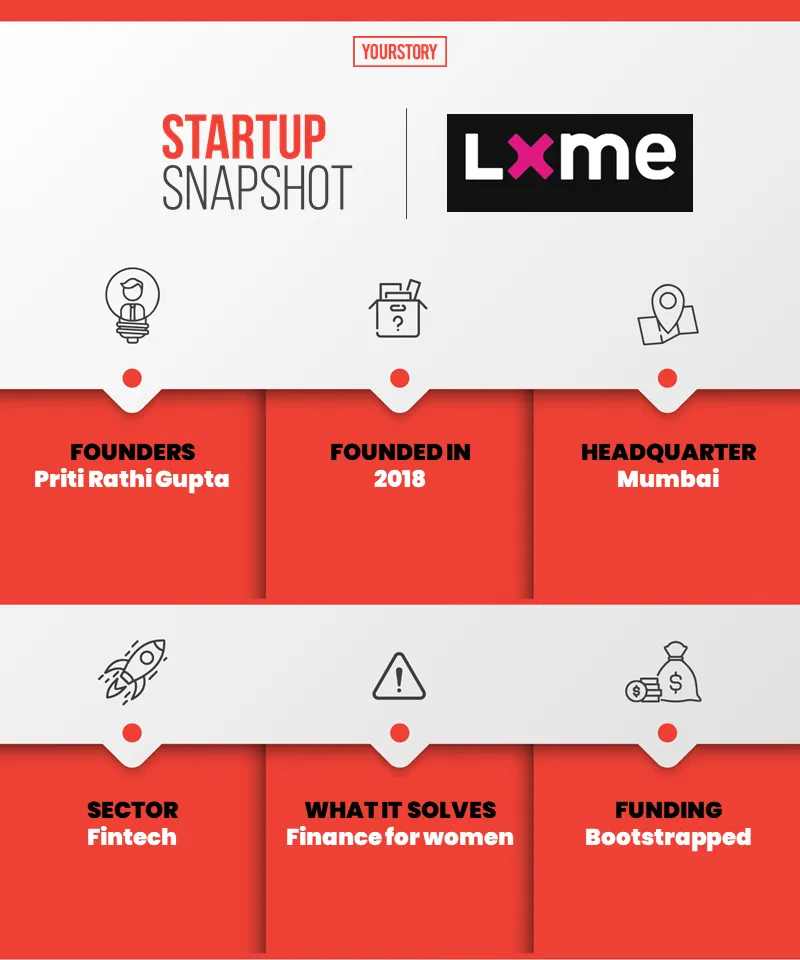Mumbai-based fintech startup LXME aims to bridge the gap between women and finance
Fintech startup LXME, founded by Priti Rathi Gupta, offers learning avenues for women, as well as communities that encourage them to become financially independent.
A disparity between men taking charge of their investments and women not doing so led self-proclaimed financial feminist Priti Rathi Gupta to launch a fintech platform exclusively for women.
After working as a financial advisor for 15 years, Priti put to use what she had learned about the investment industry to start a platform that financially empowers women.
Anand Rathi-backed LXME aims to bridge the knowledge and accessibility gap for women on money matters and helps them take their own decisions. The platform is available on the web, and as an app.
“Financial independence is an essential life skill every woman should be well equipped with in order to be truly independent,” says Priti. “My purpose is to make investing and financial planning inclusive for women, which will impact them at a personal level and the flow of investments at a macro level."
Finances, money, and investments have traditionally been male-dominated and male-oriented instruments, with men likely to manage the wealth of even financially independent women family members.
Only 33 percent of women make their own investment decisions, compared to 64 percent of men, found a DSP Winvestor Pulse 2019 survey, conducted in association with Nielsen. Only 12 percent of women said investing in market instruments such as stocks and mutual funds was their personal decision, versus 31 percent of men, who did so.

Priti Rathi Gupta, founder of LXME
Simplifying money matters
Among the biggest barriers for women looking to take charge of their finances are lack of education and awareness on what look like complex financial instruments, fear of taking risks with their money, and systemic dependence on male members of households for financial planning.
Mumbai-based LXME solves those problems in two ways. First, it provides enough avenues for women to educate themselves about financial products such as mutual funds, stocks, bonds, and options through extensive blog posts, courses, and learning modules that demystify the world of finance.
Second, it creates and facilitates a community of women to engage in conversations that make them confident about gaining more control of their finances and learn from each other as they progress on their financial journeys.
“(The community) leads to a strong call to action for women to start their financial-planning journey,” says Priti. “The depth of a peer-to-peer conversation translates into learning, as well as mentoring opportunities.”
LXME’s Think module offers financial content that can help users learn more, while the Learn feature offers interactive online courses on money management. The Financial Fitness Bootcamp teaches users the basics of financial planning including investing across life stages, debt management, and the importance of insurance.
The startup also offers literature on financial topics, goal-based investment calculators, and the option for women on the platform to invest in five mutual funds, based on their goals and timelines for the investments, via the LXME app or website.
“At LXME, we want money management to be a fulfilling experience sans the fear and intimidation attached to it,” says Priti, who went back to college after getting married at 19 and then worked full time. “My mission is to bring the joy of financial acumen and wealth creation to women.”

Targets and aspirations
Founded in 2018, LXME’s products are aimed at women in the 25-35 age group. At present, around 15,000 women are signed up on the platform and online community, with daily average users at 2,000.
The platform and the app are both free, as are the resources offered. LXME makes most of its revenue from the distribution of financial products, but says it will soon launch premium membership with more features.
Tier-I and Tier-II cities are its biggest markets at present, with the startup working to curate products for Tier-III cities and beyond as well.
An LXME 2.0 version is in the works, which will allow the startup to move all its operations to the app and become a one-stop point for its community, products, and services.
The bootstrapped startup backed by Anand Rathi says it has grown 10 percent month-on-month in terms of new investors and close to 20 percent in terms of assets under management (AUM) over the last year. It aims to hit $500,000 in AUM soon.
“The problem LXME aims to solve is universal and the solution we’re building can be useful in other emerging markets such as Africa, South America, and Southeast Asia,” says Priti.
Eventually, the fintech startup aims to turn into a neobank specialising in products and services for women.
LXME’s biggest competitors in India include , Femwealth, and the soon-to-be-launched Salt, which counts on its core team former Payments Bank CEO Shinjini Kumar, former founding team member of the bank Aditi Sholapurkar, and fintech startup Simpl Co-founder Chaitra Chidanand.
The global financial services industry could potentially gain nearly $330 billion in annual revenue by focusing on women-centric financial products and services, says a 2018 BNY Mellon and United Nations Foundation report.
The financial services industry in India is expected to reach Rs 6.21 lakh crore by 2025 from Rs 1.92 lakh crore in 2019, expanding at a compound annual growth rate of nearly 22.7 percent during the 2020-2025 period, according to a Research and Markets report. Fintech firms such as LXME that cater specifically to women can play a substantial role in powering this growth.
Edited by Lena Saha









